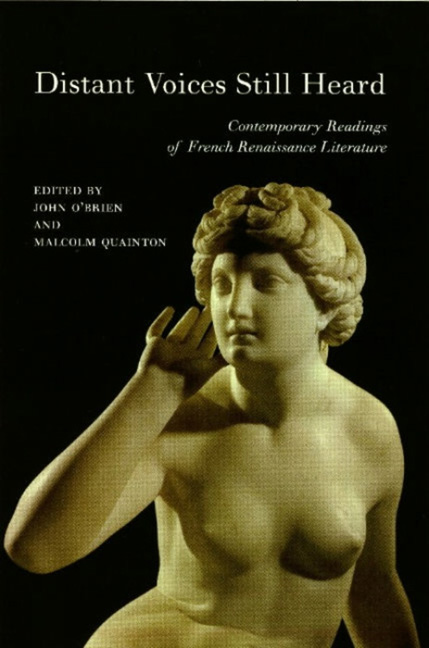Book contents
- Frontmatter
- Contents
- Editors’ Foreword
- Introduction: The Time of Theory
- 1 The Highs and Lows of Structuralist Reading: Rabelais, Pantagruel, chapters 10—13
- 2 Rabelais’ Strength and the Pitfalls of Methodology: Tiers Livre, chapters 7–18
- 3 ‘Blond chef, grande conqueste’: Feminist Theories of the Gaze, the blason anatomique and Louise Labé's Sonnet 6
- 4 Louise Labé's Feminist Poetics
- 5 Reading and Writing in the Tenth Story of the Heptaméron
- 6 Fetishism and Storytelling in Nouvelle 57 of Marguerite de Navarre's Heptaméron
- 7 Creative Choreography: Intertextual Dancing in Ronsard's Sonnets pour Hélène: II, 30
- 8 An Overshadowed Valediction: Ronsard's Dedicatory Epistle to Villeroy
- 9 ‘De l'amitié’ (Essais 1.28): ‘Luy’ and ‘Moy’
- 10 Montaigne's Death Sentences: Narrative and Subjectivity in ‘De la diversion’ (Essais 3.4)
- Select Bibliography
- Index
4 - Louise Labé's Feminist Poetics
- Frontmatter
- Contents
- Editors’ Foreword
- Introduction: The Time of Theory
- 1 The Highs and Lows of Structuralist Reading: Rabelais, Pantagruel, chapters 10—13
- 2 Rabelais’ Strength and the Pitfalls of Methodology: Tiers Livre, chapters 7–18
- 3 ‘Blond chef, grande conqueste’: Feminist Theories of the Gaze, the blason anatomique and Louise Labé's Sonnet 6
- 4 Louise Labé's Feminist Poetics
- 5 Reading and Writing in the Tenth Story of the Heptaméron
- 6 Fetishism and Storytelling in Nouvelle 57 of Marguerite de Navarre's Heptaméron
- 7 Creative Choreography: Intertextual Dancing in Ronsard's Sonnets pour Hélène: II, 30
- 8 An Overshadowed Valediction: Ronsard's Dedicatory Epistle to Villeroy
- 9 ‘De l'amitié’ (Essais 1.28): ‘Luy’ and ‘Moy’
- 10 Montaigne's Death Sentences: Narrative and Subjectivity in ‘De la diversion’ (Essais 3.4)
- Select Bibliography
- Index
Summary
Louise Labé is perhaps the most famous female poet of the French Renaissance, although there is relatively little of her work extant: a collection, published in 1555, of 24 sonnets preceded by a dedicatory epistle to Clémence de Bourges, a prose dialogue called Le Débat de Folie et d'Amour (The Debate between Folly and Love), and three elegies. In addition, there exist numerous poems dedicated to her or written about her, in both praise and blame. She belongs to the great wave of poetic innovation in sixteenth-century France, represented most illustriously by the group of poets known as La Pléiade, which included the poet Pierre de Ronsard and the author of La Deffence et Illustration de la Langue Francoyse (The Defence and Illustration of the French Language), Joachim du Bellay's manifesto of a new French Renaissance poetics.
These poets – and Labé herself – combined the two Italian Renaissance philosophical and poetic traditions known as Neoplatonism and Petrarchism. Neoplatonism came to France via Marsilio Ficino's translations of Plato's dialogues, which both heterosexualised platonic love and transformed it into a potentially Christian poetics. Thus, Neoplatonism enabled poets to reconcile the erotic and the spiritual on a philosophical level, while it also provided a schema for a poetic practice combining erotics, aesthetics and morality: by loving, humans climb a ladder of affect from the human and the physical toward the transcendent ideals of the Good and the Beautiful. Neoplatonism thus would also enable poets such as Louise Labé to praise erotic passion and argue that the love of a human object was capable of ennobling and refining the human spirit rather than corrupting and degrading it, as the traditional Church would claim. Finally, Neoplatonism served as a philosophical ruse for a poetic practice that was manifestly idolatrous, as the legacy of Petrarchism amply demonstrates.
Francesco Petrarca's (1304–1374) sonnet cycle, Rime sparse (Scattered Rhymes), became the paradigm for the sonnet sequence for generations – and indeed centuries – to come.
- Type
- Chapter
- Information
- Distant Voices Still HeardContemporary Readings of French Renaissance Literature, pp. 107 - 122Publisher: Liverpool University PressPrint publication year: 2000



